Film Name: 长津湖 / The Battle at Lake Changjin / Battle of Chosin Reservior
I’ve been looking forward to it for a long time, tossing and turning, excited …… I haven’t looked forward to a Chinese movie for a long time, and that’s because The Battle at Lake Changjin has the largest production scale and the best cast of cards of any Chinese war movie. “The Battle at Lake Changjin
I can say without shame that “The Battle at Lake Changjin” lives up to its expectations: it contributes to the war drama that best demonstrates the strength of China’s movie industry so far, the characteristics and strengths of the three directors have been utilized, and the screenwriter, Lan Xiaolong, even uses the group portrait of the “Steel Seven Company” to bring the volunteers to life! Whether the focus is big or small, it won’t let you down.
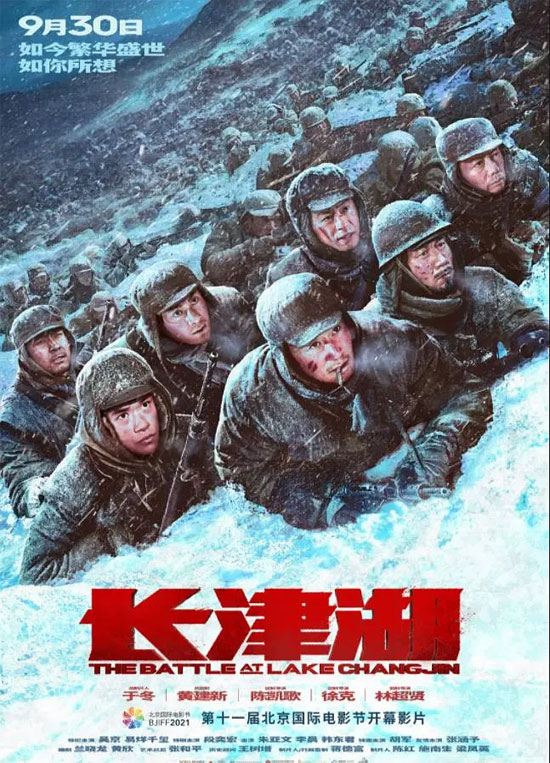
Of course, there are regrets. The film’s biggest problem is that it doesn’t have a good distribution of its main content, resulting in a confusing narrative in the second half and a lack of closure, which makes the nearly three-hour-long movie seem like a half-baked product that doesn’t finish the story.
Even so, The Battle at Lake Changjin is good enough to warrant a ticket to this year’s National Day movie.
[WARNING: Spoilers to follow].
Before watching the movie, my biggest worry was whether the three directors could work well together, for fear that they would make the movie unorthodox with their own opinions – fortunately, I was overly worried, The Battle at Lake Changjin is big enough to accommodate each director’s full play.
In the movie, I saw Chen Kaige’s comprehensive and square narrative, real and delicate emotions, and “great joy”; I also saw Lin Chiu-hsien’s “military maniac” nature, the smell of gunpowder mixed with motor oil and blood; I also saw Tsui Hark’s ingenuity of moving around in small scenes, and his fierce dislike of the special effects. The ingenuity of Tsui Hark in the small scenes, as well as the ruthless dislike of stunts ……
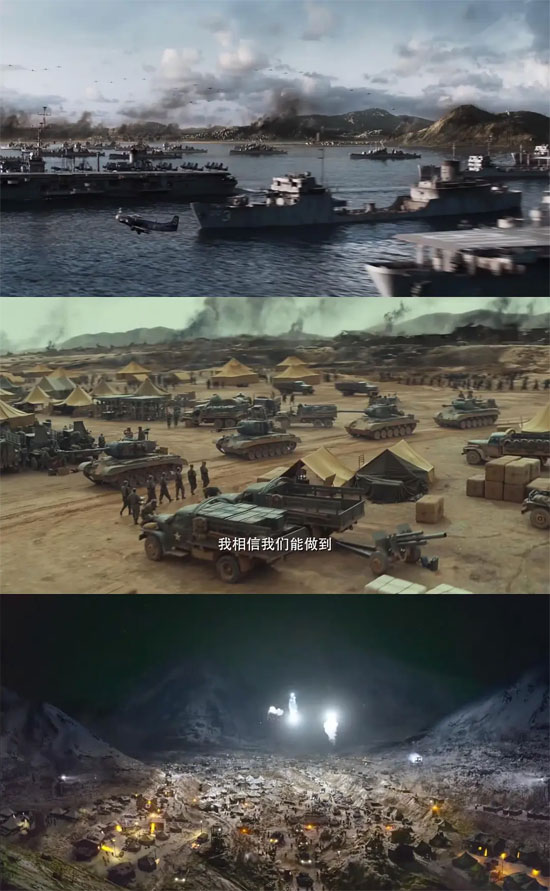
Behind all of this is the strong strength of the Chinese movie industry.
War movies with big scenes in front of the battlefield have always been a direct reflection of the “strength of the film industry” propaganda film, let’s put aside the overall perception of “The Battle at Lake Changjin”, just the props in the film, costumes, group acting, medium-length shots, and other types of hardware to show, it will be sufficient to It’s amazing – “hard power” is not something that anyone can afford to play, and the only rival that is stronger than us is American Hollywood, which has better technology, more experience, and burns money more fiercely.
Thanks to the technological progress and optimization of the international creative environment, “The Battle at Lake Changjin” is richer in details than previous anti-U.S.-aided North Korea movies, for example, in the icy snow, the U.S. army’s sumptuous meals and the volunteers’ potatoes are used successively to highlight the huge gap between the two sides’ logistical supplies and industrial strength.

In a similar vein, there was also the previous situation when the 7th Company crossed the rocky hill and had to disguise their corpses to withstand the ravages of the American planes……. These stark contrasts all further reflect the will to fight of the volunteer soldiers who braved the hardships and dangers of the strongest enemies.
On the software side, The Battle at Lake Changjin is equally pleasing, most notably in that it answers a key question: why are we fighting this battle? While it may not compare to past films like Battle of Shangganling and Heroic Sons and Daughters, it’s definitely better than last year’s Sacrifice.
The movie gives different answers from different levels and perspectives: from the viewpoint of Chairman Mao and other central government decision makers, the purpose of the anti-U.S. support for North Korea is to keep the enemy out of the country, so that a single punch can prevent a hundred punches from coming; from the viewpoint of cultured soldiers like Mei Sheng, who has a family, the purpose of the anti-U.S. support for North Korea is to spare the next generation of Chinese from experiencing the fire of war; and for the ordinary soldiers, the purpose of anti-U.S. support for North Korea is to protect the fruit of the hard-won victory, so that the family can have a share in the victory of their home country. For more ordinary soldiers, the purpose of fighting against the U.S. is to protect the hard-earned fruits of victory, to share the land with their families, to have something to look forward to in life, and to fight with anyone who tries to pose a threat to them.
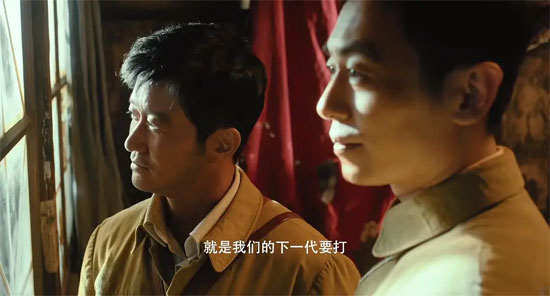
In recent years, Chinese blockbusters have often committed two kinds of faults, either indulging in “grand narratives” and appearing empty and boring, or getting lost in “personal narratives” and failing to find the spiritual main idea. …… It is not easy for The Battle at Lake Changjin to balance the two narrative features, and to use “human language” to shout out the great meaning.
At the same time, I personally have a great deal of “selfishness” towards the movie, which stems from my favoritism towards the “Dragon King” Lan Xiaolong, a screenwriter who created such excellent works as “Soldiers Sortie” and “My Chief and My Regiment”. In The Battle at Lake Changjin, the screenwriter, who created excellent works such as “Soldiers Sortie” and “My Chief and My Regiment,” introduces the 7th Interpolated Company as the absolute protagonist, continuing the saga of the “249 Universe” in the form of a prequel.
The 7th Company is the Steel Company of “Soldiers Sortie”, which is “a thunderbolt and a sword, a group of ferocious tigers”, and the company has the tradition of “registering” everyone, and all soldiers have their own numbers, and the protagonist Xu Sanduo is the 4956th member of the 7th Company. The protagonist Xu Sanduo is the 4956th soldier of the company.
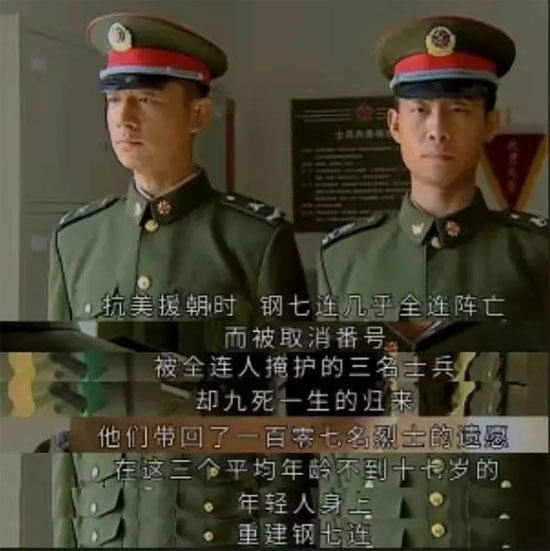
I believe that even viewers who haven’t seen Soldiers Sortie and lack the sentimentality to add to it will be impressed by the seven companies in The Battle at Lake Changjin, because the group portrait of the seven companies gives the film a crucial spice and embellishment, which greatly enhances the watchability.
The mature and reliable Wu Qianli, the straightforward and playful Yu Congrong, the sophisticated and steady Lei Suisheng, the elegant and gentle Mei Sheng, and the ruthless and not-so-talkative Pinghe …… The Seven Companies have fully interpreted the meaning of “unity, nervousness, seriousness, and liveliness” with their actual performances, which is an exaggeration to say that without Lan Xiaolong’s use of the characters, the Seven Companies would not have been able to achieve their goals. To be more exaggerated, if there is no Lan Xiaolong with seven companies constantly do “soften”, “The Battle at Lake Changjin” will appear very dry, stiff, the viewer to drop a grade.
On top of that, the movie offers the most successful character and the most exciting story line: the growth of new recruit Wu Wanli. The reason for this elevation is that Wu Wanli symbolizes many young volunteers and can be seen from the perspective of most ordinary people.
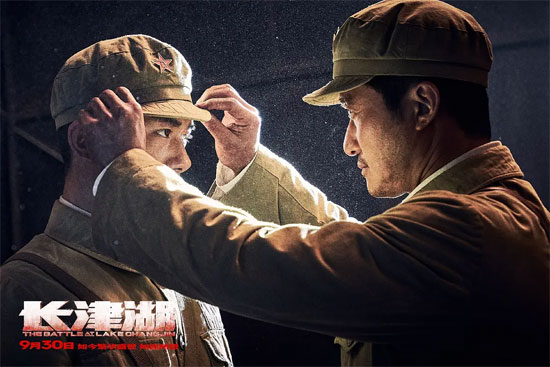
First of all, Wu Wanli is very representative in his persona. At that time, there were a large number of young soldiers under the age of 20 in the volunteer army (Wu Qianli may have also lied about his age, he was actually only 17 instead of 19), who were not as experienced as the veterans, but held the same enthusiasm.
Moreover, Wu Qianli’s growth nodes are very obvious: at first, he joined the army to make his brother look up to him; when he was brave and disobedient to discipline, he accidentally saw the great mountains and rivers outside the train, and for the first time, he vaguely touched the significance of defending the country; Zhang Xiaoshan, who was the same age, was shattered by an airplane, and underwent the blood baptism, which instantly washed away his impatience; and he followed his brother to participate in front-line battles and metamorphosed quickly between survival and death ……
It is not too much to say that Wu Wanli, the new recruit, has concentrated all the quality resources of the seven companies, the company commander/brother’s attentive care, Yu from the Rong’s pull and drag into the integration, Lei Gong’s teachings and so on, to what have what.
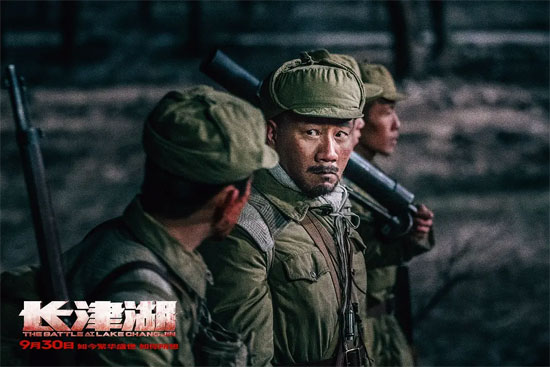
Such preferential treatment is meaningful, not only because it reflects the tradition of our army’s passing on the torch, but also because most viewers lack awareness of the brutality of the battlefield, and we need to learn about war through the lens of Wu Wanli.
The Battle at Lake Changjin” as the main theme of the war movie, in Wu Wanli’s growth experience has a high degree of condensation show: he violated the order to join the Wu Qianli side of the battle, quickly from ‘forced’ to kill the enemy to take the initiative to throw the bomb into the role; he believes that to kill more Americans to be considered a hero, and after the general attack on the Wu Qianli side of the battlefield, he was killed. During the general attack, he was educated by Wu Qianli on the courage of “doing something, not doing something”; he thought that the battalion commander, Tan Ziwei, was a “hero who can’t die”, and then was educated by Tan Ziwei on the fact that “there are no heroes who can’t die, but only martyrs who sacrificed their lives! He felt that the battalion commander, Tan Ziwei, was a “hero who could not be defeated”.
It was with this lesson that Wu Wanli was able to consciously say “No. 677, Wu Wanli” when asked who he was.
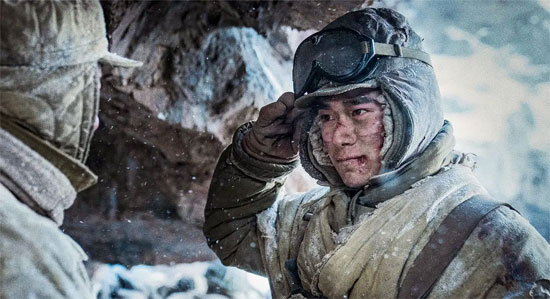
It is also because of the relatively complete growth line of Wu Wanli, the audience can better empathy, let everyone understand that the volunteer soldiers are not flat thin fighting machine, they are as flesh and blood as we are, have feelings and justice.
Having said all the good things about The Battle at Lake Changjin, I can’t hide the flaws and regrets of the movie.
I believe that the audience will be more or less this feeling: the film is very enjoyable to play, but the viewing experience is not too smooth, nearly three hours long down, the body and mind slightly tired not to mention, but also always feel that “did not finish”, so the lack of a tiger’s head and snake’s tail is the film’s biggest drawbacks.
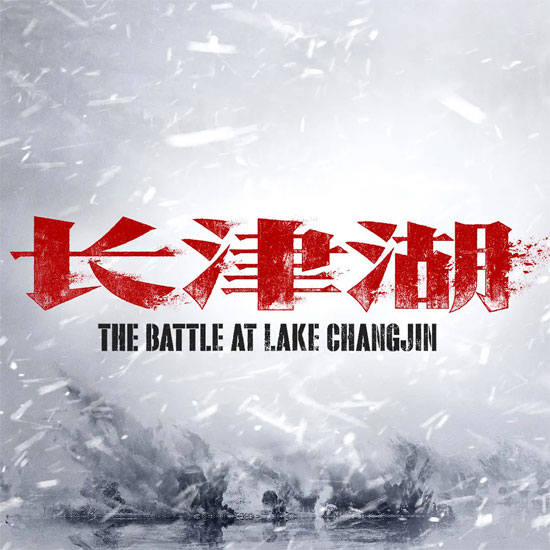
The first half of The Battle at Lake Changjin is a good one, opening with a four-pronged, top-to-bottom, domestic-to-foreign perspective that makes it clear that it’s meant to be a blockbuster that stands up on all fronts. After the main point of view falls on the seven companies, the narrative is not scattered, their goal has been very clear, escorting the radio and telegraph operator, supporting the brother unit to blow up the signal tower, blocking the enemy reinforcements and so on.
However, from the middle to the latter part of the film, the narrative has been scattered, and by the end of the film, it has lost its point of view, and become a pot of gruel, not to mention the audience who do not know enough about the specific process of the Korean War, or those who are familiar with the history of the people do not see to understand how the film ends, is it the eastern front to surround the United States Marine Corps Division 1? Was the United Nations Army pushed back to the 38th parallel? Or was it the end of the Second Battle? I’m afraid that many viewers can only take Lei Gong’s sacrifice as the ending ……
In the final analysis, it is the film makers of “The Battle at Lake Changjin” in the end into a film or two films “in the” in and out of the loss of control, which has led to such an embarrassing situation.
In the beginning, The Battle at Lake Changjin was filmed and screened according to a two-part plan, but in fact, the finished film is now more like the last episode that is missing its ending – the battle at the end of the credits lacks a real stage of closure, and Wooley has not yet completed his true maturity, the battle of the Seven Companies is not finished, and the story of The The Battle at Lake Changjin is not finished, nor is the story of The Battle at Lake Changjin.
Of course, The Battle at Lake Changjin is still flawed; it’s a blockbuster born for the big screen, so don’t miss out on a rare movie like this.
Please specify:Anime Phone Cases » The Battle at Lake Changjin 2021 Film Review: The battle was well fought! But it’s not over yet